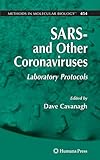SARS- and Other Coronaviruses [electronic resource] : Laboratory Protocols / edited by Dave Cavanagh.
Series: Methods in Molecular Biology, Methods and Protocols ; 454Publisher: Totowa, NJ : Humana Press : Imprint: Humana Press, 2008Description: XV, 326 p. 64 illus. online resourceContent type:- text
- computer
- online resource
- 9781597451819
- 616.9041 23
- QR46
 eBooks
eBooks
Detection and Discovery of Coronaviruses -- A Pancoronavirus RT-PCR Assay for Detection of All Known Coronaviruses -- Detection of Group 1 Coronaviruses in Bats Using Universal Coronavirus Reverse Transcription Polymerase Chain Reactions -- Detection and Sequence Characterization of the 3?-End of Coronavirus Genomes Harboring the Highly Conserved RNA Motif s2m -- RT-PCR Detection of Avian Coronaviruses of Galliform Birds (Chicken, Turkey, Pheasant) and in a Parrot -- Detection of Group 2a Coronaviruses with Emphasis on Bovine and Wild Ruminant Strains -- Detection of SARS Coronavirus in Humans and Animals by Conventional and Quantitative (Real Time) Reverse Transcription Polymerase Chain Reactions -- Detection of New Viruses by VIDISCA -- Isolation, Growth, Titration, and Purification of Coronaviruses -- Titration of Human Coronaviruses, HCoV-229E and HCoV-OC43, by an Indirect Immunoperoxidase Assay -- The Preparation of Chicken Tracheal Organ Cultures for Virus Isolation, Propagation, and Titration -- Isolation and Propagation of Coronaviruses inEmbryonated Eggs -- Large-Scale Preparation of UV-Inactivated SARS Coronavirus Virions for Vaccine Antigen -- Structure of Covs Analyzed by Electron Microscopy -- Purification and Electron Cryomicroscopy of Coronavirus Particles -- Expression of Coronavirus Proteins and Crystallization -- Production of Coronavirus Nonstructural Proteins in Soluble Form for Crystallization -- Raising Antibodies to Coronavirus Proteins -- Generating Antibodies to the Gene 3 Proteins of Infectious Bronchitis Virus -- Establishment and Characterization of Monoclonal Antibodies Against SARS Coronavirus -- Production of Monospecific Rabbit Antisera Recognizing Nidovirus Proteins -- Manipulating the Genomes of Coronaviruses -- Manipulation of the Coronavirus Genome Using Targeted RNA Recombination with Interspecies Chimeric Coronaviruses -- Generation of Recombinant Coronaviruses Using Vaccinia Virus as the Cloning Vector and Stable Cell Lines Containing Coronaviral Replicon RNAs -- Transient Dominant Selection for the Modification and Generation of Recombinant Infectious Bronchitis Coronaviruses -- Engineering Infectious cDNAs of Coronavirus as Bacterial Artificial Chromosomes -- Systematic Assembly and Genetic Manipulation of the Mouse Hepatitis Virus A59 Genome -- Identifying Coronavirus Receptors -- Identification of Sugar Residues Involved in the Binding of TGEV to Porcine Brush Border Membranes -- Pseudotyped Vesicular Stomatitis Virus for Analysis of Virus Entry Mediated by SARS Coronavirus Spike Proteins.
In 2003, the word "coronavirus" spread across the globe, somewhat further than the virus that sparked the panic. In SARS- and Other Coronaviruses: Laboratory Protocols, expert researchers examine these devastating viruses through detailed laboratory protocols. Chapters deal with such subjects as detection and discovery of coronaviruses by nucleic acid and antibody-based approaches, virus isolation, propagation and titration, virus purification, structure analysis by electron cryomicroscopy, expression and crystallization of viral proteins, raising antibodies against viral proteins, manipulation of the coronavirus genome, and descriptions of how to investigate aspects of the cell surface for coronavirus receptors. Composed in the highly successful Methods in Molecular Biology™ series format, each chapter contains a brief introduction, step-by-step methods, a list of necessary materials, and a Notes section which shares tips on troubleshooting and avoiding known pitfalls. Comprehensive and cutting-edge, SARS- and Other Coronaviruses: Laboratory Protocols serves as an ideal guide for all virologists and especially for those working with coronaviruses.


